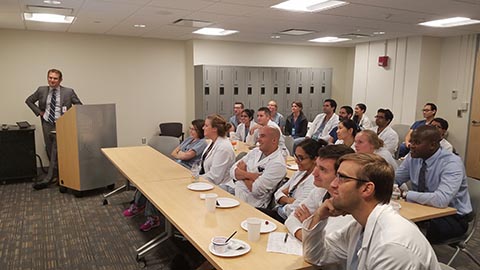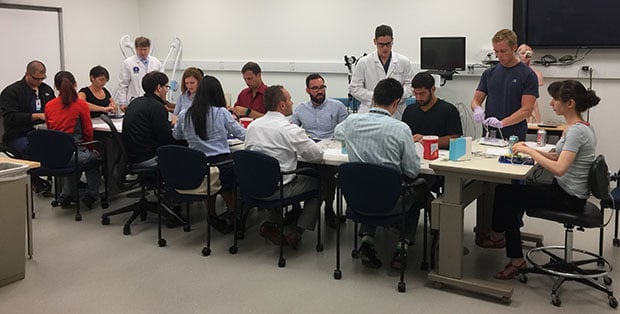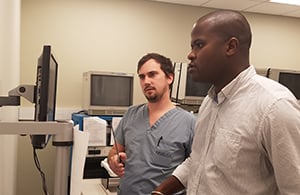Educational Didactics
Clinical and Scientific Surgery (CASS)
 Required longitudinal didactic lectures are held on Friday mornings. This is considered protected time and residents are released from all clinical duties during the hours of 7 - 8:30 am each Friday. Breakfast is served.
Required longitudinal didactic lectures are held on Friday mornings. This is considered protected time and residents are released from all clinical duties during the hours of 7 - 8:30 am each Friday. Breakfast is served.- Our curriculum is designed to follow the Surgical Council on Resident Education "This Week In SCORE" topic-of-the-week curriculum. Lectures are delivered by faculty incorporating strategies to target different learning preferences. CASS includes a simulation curriculum with dedicated robotic training and mock high stakes in exams, complemented by learning plan development.
Grand Rounds
- Residents are required to participate in a weekly Grand Rounds. The format of this conference varies between case discussions, debates and invited speakers. The departmental conference is attended by faculty, residents and medical students. Topics cover priorities for the department and the Accreditation Council for Graduate Medical Education.
- There are four named lectures (the Wheeler, Bednarz, Ellinwood and Cataldo Lectureships) and visiting professors deliver state-of-the-art lectures throughout the academic year.
- Quality Improvement Sessions held with the Emergency Department, the Gastrointestional Department, the Department of Anesthesiology and Perioperative Medicine, and the Department of Urology, are aimed at optimizing quality and the multidisciplinary approach to patient care.
Morbidity and Mortality
- Attendance at the weekly Morbidity and Mortality conference on Monday afternoons is required of all residents and faculty. During this meeting the residents, with peer and faculty support, lead a discussion investigating a safety event and establishing counter measures based on literature review.
Rotation Specific Education Sessions
- Each individual rotation provides required conferences that are specialty-specific and led by an expert in that specialty.
- A Morning Report conference held monthly provides additional opportunities for education in systems-based practice and patient care. The format includes structured case discussions and allows for resident self-assessment, complemented by evidence-based learning in real time in coordination with library staff.
Educational Resources
- Residents have remote and institutional access to all hardcopy and online texts and journals available from the program as well as from the Lamar Soutter Library at UMass Chan Medical School.
- The resident offices at the Memorial Campus and the newly renovated offices at the University Campus are fully equipped with new computers as well as print and web-based access to resources 24/7.
- Residents have 24-hour access to the Department of Surgery Simulation Center which houses a complement of laparoscopic, endoscopic and robotic trainers.

Intern Knot Tying
Case Volumes
|
Graduating Chief Resident Case Volume |
|
| Graduation Year |
Average Major Cases |
| 2016 | 924 |
| 2017 | 1050 |
| 2018 | 1262 |
| 2019 | 1217 |
| 2020 | 1205* |
| Rolling 5-year average | 1132 |
| *Expansion and pandemic |
|
|
PGY2 Surgeon Jr/First Assistant Case Volume |
|
| Graduation Year |
Average Surg Jr/1st Asst Cases |
| 2016 | 344 |
| 2017 | 376 |
| 2018 | 346 |
| 2019 | 383 |
| 2020 | 352 |
| Rolling 5-year average | 360 |
| *Expansion and pandemic |
|
